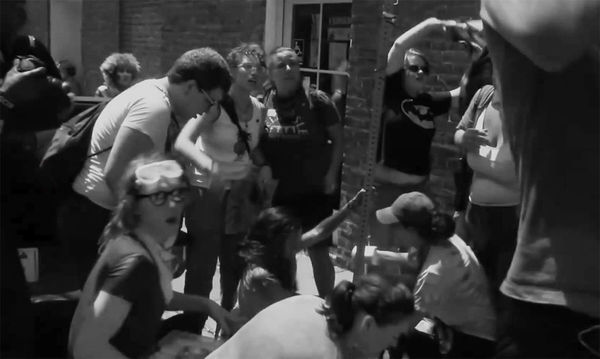
On Friday, April 9, 2021, the Klau Center hosted a panel exploring the origins and impact of the 2017 “Unite the Right” rally in Charlottesville, Va. as part of the “Building an Anti-Racist Vocabulary” weekly lecture series.
The panel consisted of Amy Spitalnick, executive director of Integrity First for America (IFA), a nonprofit committed to defending democratic norms, and attorneys Michael Bloch and Jessica Phillips, who are both members of the legal team working on Sines v. Kessler, IFA’s lawsuit against the 24 white supremacists, neo-Nazis and hate groups that organized and executed the violence surrounding the Charlottesville rally.
Spitalnick spoke about the current relevance of the hate expressed in Charlottesville. She said the white supremacy and anti-Semitism present in the Charlottesville rally was present in the Jan. 6 Capitol insurrection, the recent Pittsburgh, Christchurch and El Paso shootings and is growing increasingly prominent.
Spitalnick specifically cited the rise of the concept of “replacement theory” — which she described as the conspiracy theory that Jewish people are orchestrating the replacement of the white people.
“At the core of what happened in Charlottesville and so many of the other white supremacist attacks in recent years is a white supremacist conspiracy, called the great replacement or replacement theory,” Spitalnick said. “It’s this idea that Jews are the puppet masters orchestrating effectively a white genocide — the replacement of the white race.”
Spitalnick referenced a Thursday segment by Fox News host Tucker Carlson to demonstrate its growing popularity, saying Carlson “effectively endorsed, embraced and celebrated this idea of ‘replacement theory’.”
While arguing that the anti-Semitism present in the “replacement theory” has ties to the Capitol insurrection and recent white supremacist attacks, Spitalnick said it is important to recognize white supremacy, anti-Semitism and other forms of hate are all connected.
“You certainly can’t take on anti-Semitism without taking on white supremacy, racism, xenophobia and the other forms of hate that are inherent here,” Spitalnick said. “They are deeply interconnected and inextricable.”
Bloch described the rationale for IFA filing the case against the Charlottesville conspirators, arguing that federal prosecutors did not make a strong effort to target the organizers of the rally.
“When you had 500 neo-Nazis storming through UVA campus with Tiki torches, chanting ‘Jews will not replace us’ and surrounding a group of counter protesters and then ultimately throwing torches at them, one would think that that set of facts would fit fairly well into that statute,” Bloch said.
Bloch called the lack of prosecutions on the state level “a slap in the face” to people traumatized by the violence.
The case’s defendants are both organizations and individuals. Phillips said they were able to identify the defendants through thousands of communications leaked from the digital messaging platform Discord. The plaintiffs represent several members of the Charlottesville community who were harmed in the counter protests, Bloch said.
The trial was originally scheduled to begin in the summer of 2019 but was delayed due to problems with information exchange and then the COVID-19 pandemic. It is now scheduled to begin Oct. 26.
Phillips said the IFA team has already had five critical rulings in the case with two of the defendants facing jail time for contempt and three adverse inference rulings against the defendants. Adverse inference reveals that information in discovery was withheld intentionally and therefore is assumed to damage those that did not cooperate in discovery’s case.
Spitalnick said she is proud of the work IFA’s legal team has done and is excited by the opportunity the case provides to draw attention to white supremacy and other forms of hate in the future.
“Imagine what could be done if the full weight of all of the tools and resources we have are brought to bear in the fight against extremism, and I think that we’re hopefully starting to recognize that as a country — the capital attack put a very fine point on that,” Spitalnick said. “There’s so much more that needs to be done though.”
Originally published in The Observer on Monday, April 12, 2021.